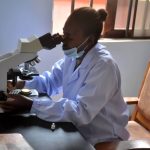AKWUEKE, ENUGU: Veronica Ugwu was just three weeks old when her parents subjected her to female genital mutilation (FGM).
“I passed through the same process, just like every woman of my age,” Ugwu said. Yet, she never knew the experience was responsible for the extreme pains she felt during menstruation until she was 37.
Once in May of 2017, when the head of Akwueke – her community in Enugu South Local Government Area of Enugu State – requested that adult community members assemble at the community’s Central Community School to hear what a visiting organisation had to say about FGM, 40-year-old Ugwu was among 66 women who honoured the invitation and sat in a large hall in the school.
“It was the first time we (community members) gathered to welcome an organisation to speak to us,” Ugwu recalled.
A group of six from the Society for the Improvement of Rural People or SIRP, a nonprofit working to improve the lives of rural people in southeast Nigeria through advocacy and vocational training, explained what FGM was as well as its harmful health implications.
The gathering lasted for two hours. By the time it ended, Ugwu was convinced that FGM was dangerous and vowed to fight it.
No health benefits
FGM is mainly carried out on young girls between infancy and age 15, using unsterilised tools like razor blades and small knives. It involves any non-medical partial or total removal of the outer and sensitive part of the female genitals.
At least 200 million women and girls alive in about 30 countries have undergone FGM, the World Health Organisation (WHO) says. In Nigeria, nearly 20 million girls and women aged between 15 and 49 have undergone the procedure, of which only about 13% were cut by health professionals.
Experts warned that COVID-19 restrictions and disruptions to health programmes discouraging the procedure could lead to an additional two million new victims by 2030.
Though the WHO has established that FGM has no actual health benefits and that it is responsible for immediate health complications (like urinary problems, severe pain, vaginal infections, shock, and death) and long term effects (like menstrual problems, heavy bleeding, and other deadly complications during childbirth), those who practice it do it for a range of beliefs centered mostly around culture and tradition.
Some people believe it is necessary to prepare a girl-child for marriage, make her clean and acceptable in society, and curtail her potentials for promiscuity.
In some parts of Nigeria, additional unfounded justifications include the belief that during childbirth, contact between a woman’s clitoris and the baby’s head could be harmful to the baby and that it increases fertility and sexual pleasure.
“We all saw female circumcision as an important cultural practice that must be done,” said Ugwu, who is also a primary school teacher.
Though traditional birth attendants and community women mostly perform the ritual, it is sometimes carried out by health professionals who believe it is safer if done by a healthcare practitioner.
“The reason is this, there are some doctors who still believe in this harmful traditional practice, especially those closer to the people in the rural areas,” said Ifegwu Kalu, medical director of Prescot Specialist Medical Centre in Benue State. He adds that the long-term impacts are also psychological and emotional.
“FGM bothers on emotions, psychology, and the physical [and] that is why there are so many problems survivors face, including a problem with having sex,” he said. “So, they [FGM survivors] need continuous support at the end of the day.”
Failed efforts to end FGM
In May 2015, the federal government outlawed the harmful practice through the Violence Against Persons Prohibition (VAPP) Act, which stipulates a four-year jail term or N200,000 ($487) fine for anyone who engages in it or other violent acts like rape and spousal battery. However, there is no reported case of prosecution since the law came into effect. And only half out of the country’s 36 states have adopted the Act.
SIRP works to discourage the practice in Nigeria’s southeast region. In five rural communities where the practice is observed to be high in Enugu (Akwueke in Enugu South Local Government Area (LGA), Awgu in Awgu LGA, Obollo-afor in Udenu LGA, Okpanku in Aninri LGA, and Gabon in Enugu East LGA), the group holds awareness-raising programmes to educate people about the dangers and the need to end it.
Each time the organisation chooses a community to work in, it begins by approaching and educating its religious and community leaders. Once SIRP gains the support of the leaders, it then works with them to organise bigger events where more community members can be educated about the issue.
SIRP often plays emotion-laden videos with footage of girls crying as they are cut but also of women grappling with the after-effects as adults.
“The reason for the video is to change their mindset and evoke emotions to help create [positive] change,” said Chris Ugwu, SIRP’s founder.
So far, the approach has worked; at least anecdotal evidence points to some impact. Some families say they have stopped the practice.
“It is true, FGM is not good [and] the videos also helped us realise this,” says Anthonia Udeh, a mother of eight and FGM survivor in Akwueke who said she often experiences excessive bleeding during childbirth. “If the clitoris is cut, [a woman’s] sex urge reduces. But to us, our culture was more important.”
For Ugwu, the FGM survivor, it is not enough to end the practice in one’s family, but there is a need to advocate broadly against it.
“Today, I now go about, especially to my relations, telling the people the danger of FGM practice,” she said.
Founded in 1999, with sponsorship from UK-based Wallace Global and Rockflower, a New York-based nonprofit working to improve women and girls’ maternal and reproductive health, SIRP has reached over 5000 women and girls with the message.
Its founder, Chris Ugwu, said the group’s decision to campaign against FGM came after discovering that its long-term impact puts women in more vulnerable and painful positions.
In 2019, along with 10 other nonprofits, SIRP submitted and supported a bill to the Enugu State legislative assembly seeking to criminalise FGM and other forms of violence against women. The result was the “Violence Against Persons Prohibition Act,” a state law stipulating a six-month jail term or N200,000 ($487) fine for offenders. But like the federal law, implementation is weak, and no prosecutions have been recorded.
And SIRP’s reach, which also includes providing sustainable livelihood options to poor rural settlers through vocational training, is limited by a range of challenges, including limited financial resources.
It is also worried that increased performance of FGM by healthcare professionals is working against efforts to end the practice. Its founder said the organization is seeking financial support to take its advocacy to healthcare workers.
Yet, he acknowledges that the fight against the practice cannot be won overnight because: “People hold custom sacrosanct” and “we just need to be patient because [a] practice rooted in culture is not easy to totally erase.”
But he is glad there is an impact. “There’s progress, [which] we see as a success story,” he said. “Unlike before, people now say it openly that FGM is bad.”
This article was first published on progressclock.com with the headline “For this Nonprofit, Ending Female Genital Mutilation is a Mission” before our migration to primeprogressng.com.
Veronica Ugwu, a survivor of female genital mutilation (FGM), realized the health implications of her experience later in life. During a community meeting organized by the Society for the Improvement of Rural People (SIRP) in 2017, she learned about the dangers of FGM and committed to fighting the practice.
FGM involves the partial or total removal of female genitalia for non-medical reasons and is prevalent among young girls, despite its severe health risks as highlighted by the World Health Organization (WHO). Cultural beliefs often drive the practice, despite its lack of health benefits and potential for causing severe long-term health issues, including psychological and emotional damage.
Efforts to end FGM include federal laws and local campaigns, but enforcement is weak, and cultural resistance remains strong. Organizations like SIRP work to educate communities through emotional videos and awareness-raising programs, resulting in some families abandoning the practice. However, challenges such as financial constraints and healthcare professionals performing FGM persist.
SIRP continues to advocate for broader awareness and legislative support to combat FGM, acknowledging that changing deep-rooted cultural practices is a gradual process.






